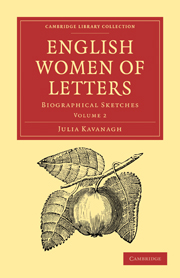Summary
Amongst the women who have won celebrity in fiction, three will long remain pre-eminent for a thoroughly feminine quality—that of teaching. This natural gift, which will may perfect, but cannot bestow, has never been possessed more completely, and exercised more successfully, by man or woman, than by Mademoiselle de Scudéry, Madame de Genlis, and Miss Edgeworth. With the three, teaching was the first object, literature came next. They wrote to improve their readers, not by actual scientific knowledge, but by advice, by lessons kind, delicate, and persuasive. Mademoiselle de Scudéry wished to make society and women more polished, more refined, more virtuous. Madame de Genlis devoted herself to childhood and to youth; to inculcate knowledge, practical and theroretical, was her object. Miss Edgeworth's aim was similar, but less educational; and her method was essentially different. Madame de Genlis preached virtue, but rather ideally. Her virtue is inexorable, and often unattainable. The grand romance of life, love tender and true, she treated coldly and sceptically; she admitted the reality of passions which she deprecated, and she often drew them with a fidelity that made their perils alluring. She wrote for children, or for married women; the medium of dreaming girlhood was never the public she contemplated; she said so, and her works say so too.
- Type
- Chapter
- Information
- English Women of LettersBiographical Sketches, pp. 115 - 149Publisher: Cambridge University PressPrint publication year: 2010First published in: 1863

